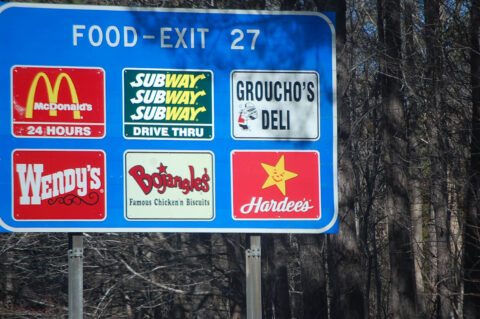Tim Worstall points out that the California state government is — intentionally or not — running an interesting economic validation of the Card & Krueger study in New Jersey that seemed to show raising minimum wages didn’t have a negative impact on overall employment:

“Fast food” by Daniel Barcelona is licensed under CC BY 3.0 .
For think back to that New Jersey minimum wage study, Card and Krueger. That showed that acshully, employment in fast food joints rose when the minimum wage went up. Now, I’ve been saying for a long time now that I think there’s a fallacy of composition there.
“Fast food” isn’t “fast food”. There are — at least — two sectors here. There’re those big national chains, lots of advertising, franchisees, MaccyD’s and the like. Then there’s a vast hinterland of Mom and Pop places. The financial structures are entirely different. The chains are capital intensive. I think I’ve seen that buns for burgers come in pre-cut. Salad definitely arrives in bags, already shredded. There’s no prep – not even prep areas in those kitchens. Mom and Pop run differently. One reason I know is because I’ve owned and run one. There’s an awful lot of labour that goes into turning blocks of stuff into those sandwiches. Stuff is sliced, diced, soups are cooked on site, from identifiable ingredients, bread is sliced and on and on.
No, this isn’t to try and riff off The Bear. But there is a difference in economic structure between those who are large corporates vending fast food and not-large corporates vending fast food.
And I think — think, me, I do — that the problem with the Card and Krueger study was that it didn’t account for this. A change in the general labour rate might push people to the capital intensive end of this market. Certainly could do, it would be possible to model it that way. Which means that using only the data from the fast food chains, as C&K did, would pick up only part, perhaps half, of the reaction. The Mom and Pops shed labour, the capital intensive chains modestly pick it up, the net effect is — well, the net effect could be anywhere actually.
Which is what makes this CA minimum wage change so interesting. Because the $20 an hour applies only to those working for the big national chains — or their franchisees.
Mom and Pop have to pay the normal CA minimum wage, not the $20. So, the labour intensive part of the overall system has just been handed a competitive advantage against the capital intensive end of it. We would expect, could possibly measure, that the overall employment outcome is positive.
No, really. I’d be willing to defend the idea that it could be, certainly. Note that “could”. So, we’ve two sectors, capital intensive, labour intensive. We’ve just said that the capital using guys now have to pay more — much more — for their labour than the labour intensive guys. The capital intensive guys can only respond by higher prices or worse service (ie, fewer labour hours). The labour intensive sector might end up picking up so much of the traffic that they expand employment — expand employment so much as to actually increase overall fast food sector employment. By shifting from the capital to the labour intensive sectors.
This should be studied, right? Now, my actual economic skills — rather than ruminations — are zero so it’s not going to be me checking this out. But I recommend it as something for someone looking for a PhD subject to think about. Possibly even someone more senior than that looking for a point upon which to make their bones.
Does a higher minimum wage that only — only — applies to the capital intensive portion of an economic sector like fast food actually increase employment? By shifting the sector over to the more labour intensive sector not subject to that higher minimum wage?
Logically, it could, significant empirical work would be necessary to show it though.



